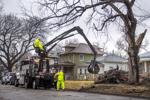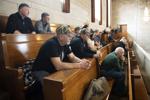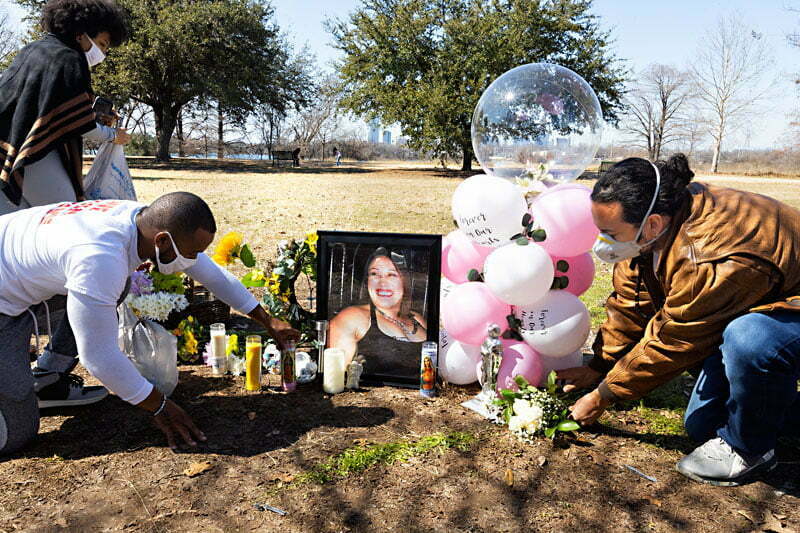Anthony Jackson (l) of WeCanNow and João Paulo Connolly of Austin Justice Coaltion arrange candles and flowers at a memorial for Rosemary Renteria (Photo by Jana Birchum)
There’s a circle of bare soil, about 6 feet wide, in the grass at Longhorn Shores, just south of the namesake dam. Look up, and one sees Downtown across the water. Look down, and there’s a baby-pink balloon arrangement, bobbing in the wind. There are about 30 other bald spots in the grass like it.
This one is where Rosemary Renteria‘s tent stood until Tuesday, Feb. 22, and where her lifeless body lay as Austin police and parks employees evicted her unhoused neighbors from the park that day. Tents came down, things tumbled into the back of a trash truck, and people carried what they could across S. Pleasant Valley Road, across the Krieg Field sports complex, and into the woods.
On Sunday, Feb. 27, Connie Garza sat in a folding chair just outside of Rosemary’s circle, hugging a large framed photo of her daughter Rosemary and stroking the glass with her thumb. The 71-year-old was only 12 when she gave birth to Rosemary on a chilly November day in the Texas Panhandle; they grew up almost as sisters.
“I saw it on the news,” Garza said – the report that a woman’s body lay in a tent during a sweep. “I told my husband, ‘I hope it’s not my daughter,’ and he said, ‘Don’t think that way.'”
Anthony Jackson, founder of nonprofit WeCanNow, was led by one of Rosemary’s neighbors to her tent on Tuesday, ahead of the scheduled camp sweep at Longhorn Shores, which had attracted more unhoused residents in recent weeks. When he saw the body, Jackson called 911 and then Austin Justice Coalition‘s organizing director João Paulo Connolly, who drove straight over. Both men expected the sweep would be paused, at least until her body had been transported. It wasn’t. “I saw cops that were actually laughing out there, and there was nothing out there that was a laughing matter,” Jackson said.
Connolly said he asked an officer if it was appropriate to continue with the sweep, but the cop “snapped at me and told me to get back.” Once police determined Renteria’s death was not suspicious, the sweep went on while the Office of the Medical Examiner headed to the scene.
“The Austin Police fully recognizes and appreciates the value of human life. Crime scene tape was put up to preserve the dignity and respect of the deceased and to preserve the integrity of a potential crime scene,” an APD statement said. “Weeks, if not months of planning, have taken place among several city departments for this clean-up to take place.”
The statements from APD and the Parks and Recreation Department pointed out that encampments like the one where Renteria died are once again unlawful, both under city code and state statute. With another wave of cold temperatures expected midweek, the site had been designated Priority Level 3 (out of 5) by PARD homelessness response staff – a source of concern and complaints from neighbors and trail users, and in a highly visible location.
“I saw cops that were actually laughing out there, and there was nothing out there that was a laughing matter.” – Anthony Jackson, founder of WeCanNow
Many who were camped there are now living in the woods behind Krieg, near the Roy Guerrero Colorado River Park disc golf course. On Sunday, Jackson led a group of volunteers into the woods and set up a table with fresh fruit and other foods. He popped the trunk of his SUV to reveal stacks of pants and Skechers sneakers. A line of people formed. While they waited, they laughed at a chihuahua who howled alongside people whistling the Andy Griffith Show theme.
A trio of disc golfers appeared with a beagle, who was happy to play with a camp dog while the humans scowled. One golfer looked at the line of unhoused neighbors and shouted to Jackson, “You’re not supposed to park here.”
Jackson told the Chronicle that police rarely patrol just to harass the unhoused: “The issue is the common folk who jog along these trails. … They’re calling every day.” The consequences can be grave. Robert was one of those who moved into the woods from Longhorn Shores; even with seven days’ notice of the sweep, he said he was taken by surprise. Robert unzipped his tent to show its bare interior. “I’m naked.”
Steve, 67, has been living in the woods ever since police swept his old camp about eight months ago. He was not surprised to learn a cleanup went on despite the discovery of a body. “They’re worse than Nazis. They’re assholes. There’s no compassion.”
Another neighbor in the woods, Jason, said he briefly worked for Relief Enterprise Inc., a contractor that does trash pickup after sweeps. His boss pointed to tents and bicycles and told Jason to throw them out. “So I quit,” Jason said. “I told them, ‘I’m living on the street now myself and I’m not going to pick up their stuff and then go live with them.'”
After everyone was fed and clothed Sunday, Jackson drove back to the memorial at Longhorn Shores, where Rosemary’s family sobbed, prayed, and expressed bewilderment. Rosemary’s sister Olivia Ortiz wanted officials to know that Rosemary’s life was precious. She loved to dance and be near the water. She was quiet. She loved Prince and Tupac. She was a mother to three daughters and a son.
Ortiz said she hopes, if nothing else, the story of her sister’s death will change minds about sweeps. “They left her body here for a few hours,” Mary Gallejos, Rosemary’s aunt, said. “I can’t comprehend that. How could anybody – how could you have no empathy?”





































